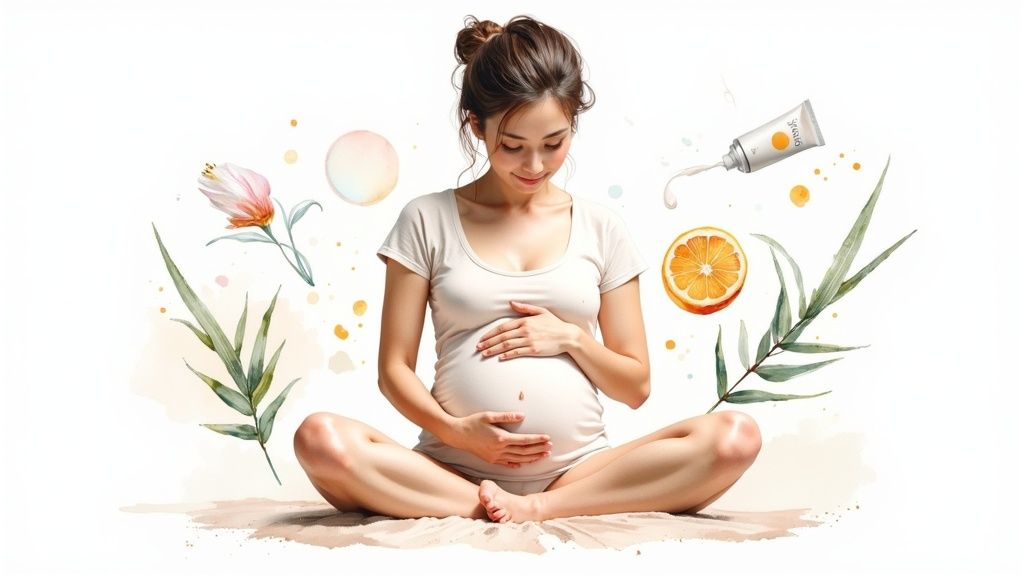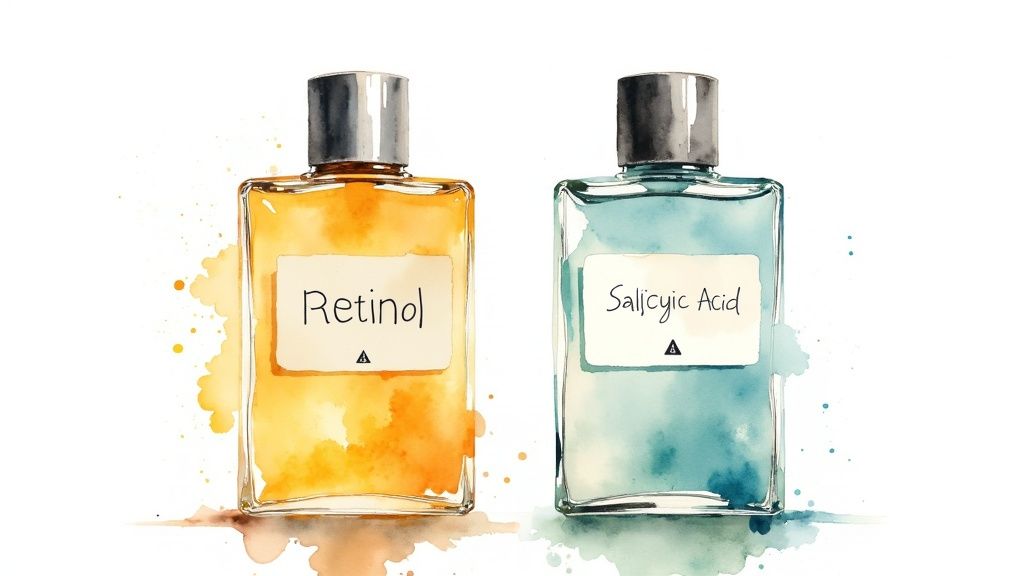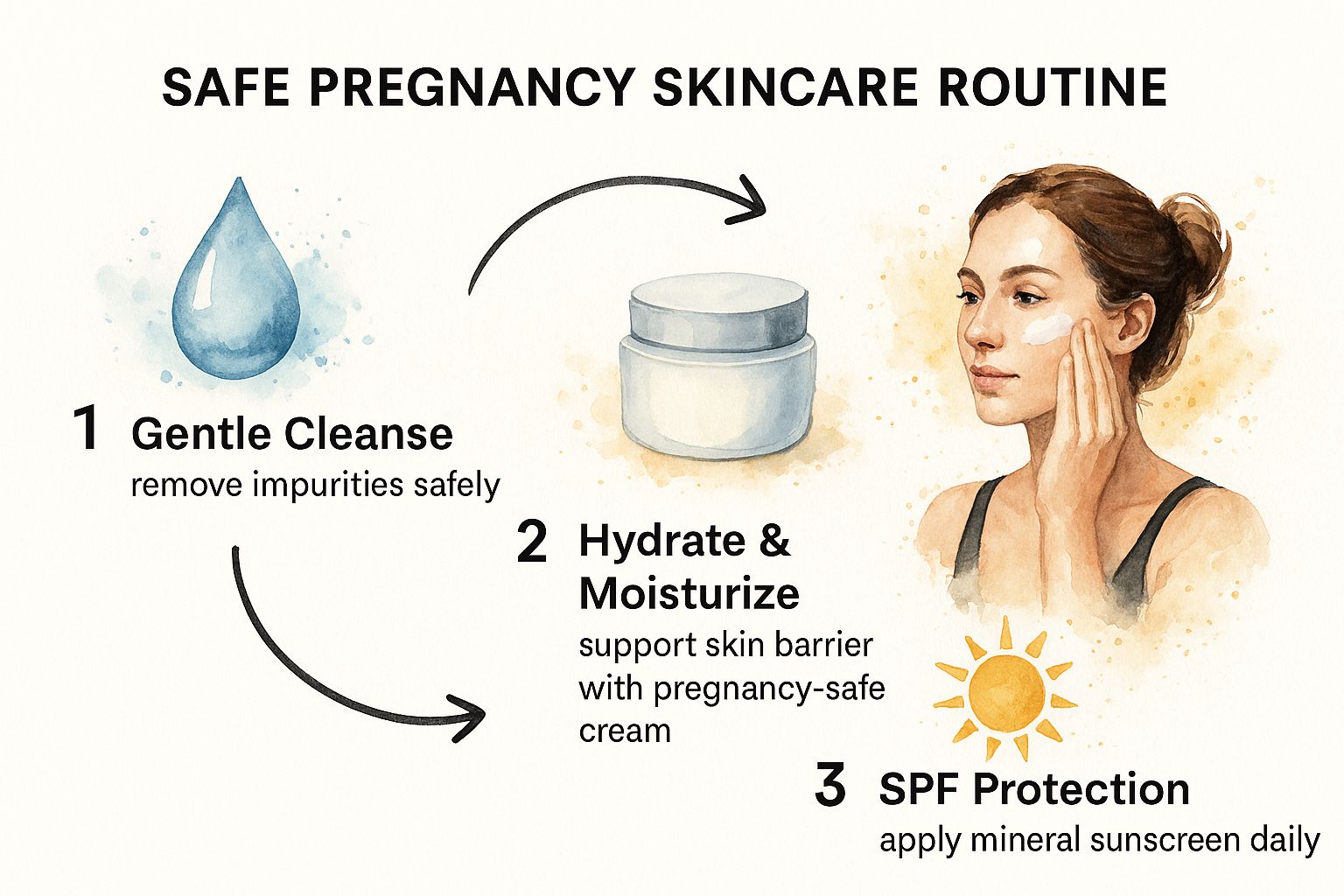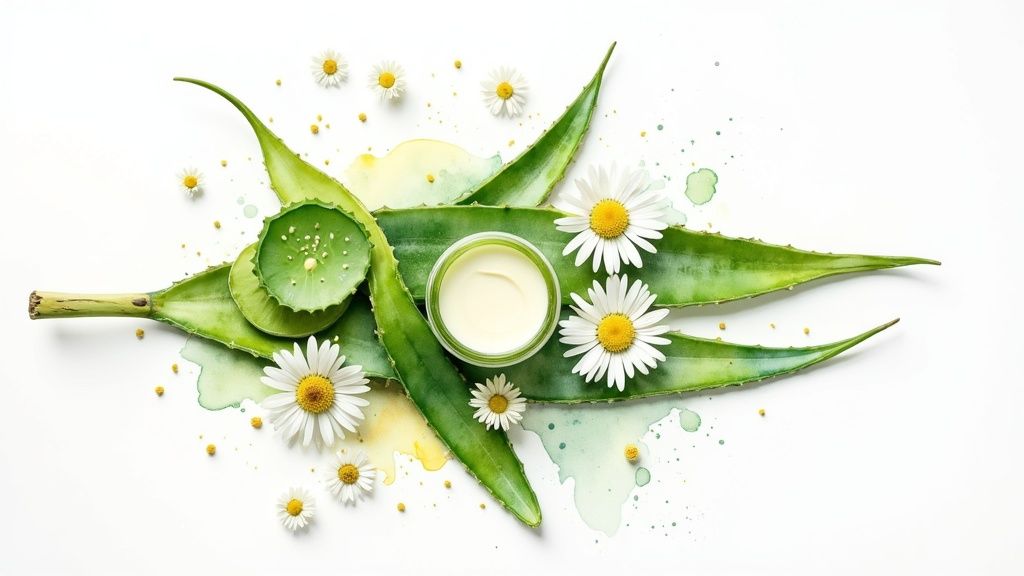
A Guide to Safe Skincare During Pregnancy
When you're pregnant, rethinking your skincare routine is less about a total overhaul and more about a thoughtful edit. It’s about temporarily swapping out a few heavy-hitting ingredients for gentler, yet still effective, alternatives. The main goal is to sidestep products known to be absorbed into the bloodstream, like retinoids, and lean into nourishing heroes like hyaluronic acid and mineral-based sunscreens. This simple switch keeps your baby safe while still tackling the new skin challenges that pop up thanks to all those hormonal shifts.
Why Your Skincare Routine Needs a Rethink

Pregnancy changes everything, and your skin is front and center for the ride. Those tried-and-true products you've sworn by for years might suddenly need to be benched, and there’s a good reason for it. Think of your skin as a very smart, selective barrier. While it does a fantastic job of keeping most things out, some tiny molecules from your skincare can slip through and make their way into your bloodstream.
This is exactly why we talk about "pregnancy-safe" skincare. While the vast majority of what you put on your skin stays on your skin, a few powerful ingredients have the potential to pose risks to your developing baby. For instance, research is increasingly showing how certain chemicals in everyday personal care products can impact both mom and baby. One study noted that things like makeup and hair dye could be linked to higher internal levels of PFAS, a group of chemicals tied to some not-so-great health outcomes. You can dig deeper into these findings on personal care products on brown.edu.
Understanding Hormonal Skin Shifts
On top of worrying about what's being absorbed, you're also dealing with a whole new set of skin behaviors, all thanks to a major hormonal surge. These fluctuations are the real culprits behind the most common skin complaints during pregnancy.
- Melasma: You might have heard this called the "mask of pregnancy." It shows up as dark, splotchy patches on your face, caused by your body producing extra melanin. Sun exposure is its best friend, which is why a daily SPF becomes your most important skincare step.
- Pregnancy Acne: If you feel like a teenager again, you can thank those hormones for kicking your oil glands into high gear. This often leads to breakouts on your face, chest, and back.
- Heightened Sensitivity: Suddenly sensitive to your favorite sweater or face cream? It's common for skin to become easily irritated, red, dry, and itchy during pregnancy.
Once you get the "why" behind these changes—both the internal hormonal roller coaster and the external product concerns—making smart choices feels so much easier. You don't have to give up your routine; you just need to adapt it for this unique chapter.
It all comes down to embracing a new, temporary philosophy for your skin. For the next nine months, the focus is on ingredients with a proven track record of safety and effectiveness. This approach helps you maintain that healthy, happy glow without any of the extra stress.
Here’s a quick-reference table to make swapping out ingredients a little easier.
Quick Guide to Pregnancy Skincare Swaps
| Ingredient to Avoid | Reason for Concern | Safe Alternative |
|---|---|---|
| Retinoids (Vitamin A) | High doses are linked to birth defects. All forms (Rx and OTC) are best avoided. | Bakuchiol or Glycolic Acid (in low concentrations). |
| High-Dose Salicylic Acid | Oral use is a known risk. Topical high-dose peels and treatments should be avoided out of caution. | Lactic Acid or Azelaic Acid for exfoliation and acne. |
| Hydroquinone | Has a relatively high systemic absorption rate (up to 45%). | Vitamin C or Niacinamide to address dark spots. |
| Chemical Sunscreens | Concerns about hormonal disruption from ingredients like oxybenzone. | Mineral Sunscreen (Zinc Oxide, Titanium Dioxide). |
| Certain Essential Oils | Some can stimulate uterine contractions or are not well-studied for pregnancy. | Squalane or Rosehip Oil for hydration. |
Think of this as your cheat sheet for a worry-free skincare routine, helping you confidently choose products that nourish your skin while protecting your little one.
Key Skincare Ingredients to Steer Clear Of
Trying to read a skincare label while you're pregnant can feel like you need a chemistry degree. It's overwhelming, but the good news is the list of ingredients to truly avoid is shorter than you might think. These ingredients are often heavy-hitters in the skincare world, so it's important to know how to spot them. My goal here isn't to scare you, but to give you the confidence to know what to keep on your shelf and what to tuck away for the next nine months.
So, why are some ingredients on the "no" list? It comes down to two things. Some have solid research linking them to potential risks. Others are on the list simply because we don't have enough research on pregnant women to prove they're safe. It's a classic case of "better safe than sorry," which is why taking a proactive approach to safe skincare during pregnancy is always the best bet.
Retinoids: The Big One to Pause
If there's one ingredient to stop using immediately, it's retinoids. This is the whole family of Vitamin A derivatives—you might know them as retinol, tretinoin (like in Retin-A), or isotretinoin (Accutane). They're famous for speeding up cell turnover, which is fantastic for fighting acne and smoothing fine lines.
The problem is, high doses of Vitamin A taken by mouth have been directly linked to serious birth defects. While you're not absorbing nearly that much from a face cream, no one can say for sure what a "safe" level of topical absorption is. The potential risks are just too high, so every single dermatologist and OB-GYN will tell you to stop using all retinoids—prescription or over-the-counter—the moment you start trying to conceive or as soon as you get a positive pregnancy test.
High-Dose Salicylic Acid and Other BHAs
Salicylic acid is a beta-hydroxy acid (BHA), and it’s a go-to for acne because it gets deep into your pores to clear them out. The thing is, it's in the same family as aspirin, which isn't recommended during pregnancy, especially when taken orally. Because of this connection, experts advise against using high-concentration salicylic acid treatments, like professional chemical peels or potent leave-on products.
Now, don't panic if it's in your face wash. Most doctors agree that the tiny amount in a rinse-off cleanser is probably okay. But honestly, it's often easier and safer to just swap it out for a pregnancy-safe alternative like azelaic acid or a low-strength glycolic acid for a while.
The whole philosophy behind pregnancy-safe skincare is simple: minimize any potential risk, no matter how small. It’s about making smart, conservative choices for nine months to give yourself complete peace of mind.
A Few Other Ingredients to Watch
Beyond the main two, there are a few other common ingredients that deserve a closer look. The science isn't always as black-and-white here, but caution is your best friend right now.
- Hydroquinone: This is a very effective skin-lightening ingredient often used for melasma (the "mask of pregnancy"). The catch? Your body can absorb a pretty high amount of it—up to 45%! Because so much can get into your bloodstream, it's best to avoid it completely.
- Certain Chemical Sunscreens: Ingredients like oxybenzone have come under fire for potentially acting as endocrine disruptors. While the jury is still out, many expecting moms feel more comfortable switching to mineral sunscreens. These use zinc oxide and titanium dioxide, which sit on top of the skin like a physical shield instead of being absorbed.
- Formaldehyde-Releasers: You don't see these as much anymore, but they are a hard "no." These are preservatives that can release small amounts of formaldehyde over time. Keep an eye out for names like quaternium-15, DMDM hydantoin, and diazolidinyl urea on ingredient lists.
It's also worth thinking about how often you use your products. A fascinating study that followed 9,710 pregnant women found a link between using cosmetics five or more times a week and a higher risk of babies being born small for their gestational age. This really drives home the point that what you put on your skin—and how frequently you do it—matters. You can dig into the full research about these pregnancy and cosmetics findings to learn more.
Finding Your Pregnancy-Safe Skincare Saviors

Now for the good part—your skincare routine doesn’t have to be a nine-month snooze fest. Even with a few key players temporarily benched, there’s a whole world of effective, nurturing, and completely safe ingredients ready to step up. I like to think of it as a great excuse to get back to basics and focus on what truly supports your skin.
Building a routine with safe skincare during pregnancy is all about shifting your focus to what you can use. These powerhouse ingredients are well-loved for being both gentle and incredibly effective, helping you handle everything from hormonal breakouts to sudden dryness without worry.
The Hydration and Brightening Dream Team
When your skin is feeling tight, tired, or just plain blah, these two are your go-to heroes. They work wonders to bring back moisture and restore that natural glow, safely and effectively.
Hyaluronic Acid: This is the ultimate drink of water for your skin. Think of it as a tiny moisture magnet that can hold up to 1,000 times its weight in water, pulling hydration into your skin and locking it in. It visibly plumps up skin, eases dryness, and delivers that dewy, fresh look. Since our bodies produce it naturally, it's one of the safest and most reliable ingredients out there.
Vitamin C: As a brilliant antioxidant, Vitamin C is your best friend for brightening. It’s fantastic for tackling dark spots (including the "mask of pregnancy," melasma), evening out your overall skin tone, and shielding your skin from daily environmental stressors. For best results, look for stable forms like L-ascorbic acid in a morning serum.
The best pregnancy-safe skincare isn't about giving things up. It’s about being intentional and choosing smart, multitasking ingredients that genuinely support your skin's health. You can absolutely maintain a clear, radiant complexion with a gentle and targeted routine.
These two ingredients create the perfect foundation for any morning regimen, working together to hydrate, protect, and brighten your way to a healthy glow.
Calming and Clearing Problem-Solvers
Hormonal rollercoasters can often lead to unexpected breakouts and sensitivity, but you don't just have to ride it out. There are some fantastic pregnancy-approved ingredients that are champions at calming inflammation and keeping skin clear.
Azelaic Acid is a true standout here. Derived from grains like barley and wheat, it’s a gentle acid that’s amazing at tackling both acne and the redness that often comes with it. It works by lightly exfoliating, fighting acne-causing bacteria, and reducing inflammation. It’s my top recommendation as an alternative to retinoids for keeping hormonal breakouts under control.
Likewise, Niacinamide (Vitamin B3) is another all-star you’ll want in your corner. This jack-of-all-trades helps strengthen your skin's natural barrier, soothe redness, balance oiliness, and minimize the look of pores. It's incredibly calming, which is perfect for the heightened skin sensitivity many people experience during pregnancy.
Your Non-Negotiable for Sun Protection
If you do only one thing for your skin during these nine months, please make it a daily mineral sunscreen. Hormonal shifts can make your skin extra vulnerable to hyperpigmentation, and sun exposure is the number one thing that triggers it. Mineral sunscreens are the undisputed top choice for safe skincare during pregnancy, and for a very simple reason.
Instead of getting absorbed into the skin like chemical sunscreens, they create a physical shield that sits right on the surface.
- Zinc Oxide: The gold standard. It provides broad-spectrum protection from both UVA and UVB rays and even has some lovely anti-inflammatory benefits.
- Titanium Dioxide: Another physical blocker that’s great at deflecting UVB rays. It’s often paired with zinc oxide to give you complete coverage.
These ingredients work by literally bouncing harmful UV rays away from your skin, offering immediate and reliable protection without any of the concerns tied to some chemical filters.
Building Your Daily Pregnancy Skincare Routine
Alright, so you know which ingredients to keep and which to kick to the curb. Now for the fun part: putting it all together into a routine that actually works for you and your baby.
Building a pregnancy-safe skincare routine isn't about a 10-step, complicated affair. Honestly, who has the energy for that? It's about getting back to basics and focusing on what your skin truly needs as it navigates all these hormonal changes. The best approach is built on four core pillars.
The Four Pillars of Pregnancy Skincare
Think of these four steps as your skin's non-negotiables. A simple, consistent routine will always do more for you than a complex one you only do half the time, especially when your skin is feeling extra sensitive.
Cleanse: Start your day (and end it) with a gentle, hydrating cleanser. Your goal is to get rid of grime and excess oil without stripping away the natural moisture your skin is desperately trying to hang onto. Milky, creamy, or gel-based cleansers without added fragrance are your best friends right now.
Treat: This is your problem-solving step. In the morning, a Vitamin C serum is brilliant for brightening your complexion and giving you a much-needed antioxidant shield. At night, you can switch to an azelaic acid or niacinamide serum to help keep breakouts and redness in check, all without the worry.
Moisturize: Pregnancy can really do a number on your skin's hydration levels, making a great moisturizer an absolute must. Look for products loaded with goodies like ceramides, glycerin, or hyaluronic acid. These ingredients are fantastic at locking in moisture and keeping your skin barrier strong and healthy.
Protect: This is, hands down, the most crucial step of your morning routine. A broad-spectrum mineral sunscreen with at least SPF 30 is your best weapon against melasma—often called the "mask of pregnancy"—and other sun-related issues your skin is more vulnerable to at the moment.

As you can see, it really boils down to a simple, effective flow. Keeping things minimal is the surest way to happy, healthy skin throughout your pregnancy.
Sample Morning and Evening Routines
So, what does this actually look like day-to-day? Here’s a straightforward template to get you started. Remember, you can always tweak this based on how your skin is feeling.
For a deeper dive into the fundamentals of creating a regimen from scratch, you can read up on how to build a skincare routine.
Below is a simple morning and evening plan that puts the four pillars into practice.
Sample Pregnancy-Safe Skincare Routines
| Step | Morning Routine (AM) | Evening Routine (PM) |
|---|---|---|
| 1 | Cleanse: Wash face with a gentle, hydrating cleanser. | Cleanse: Double cleanse if wearing makeup, or use a gentle cleanser. |
| 2 | Treat: Apply a Vitamin C serum to dry skin. | Treat: Apply azelaic acid or niacinamide serum. |
| 3 | Moisturize: Follow with a ceramide-rich moisturizer. | Moisturize: Apply the same hydrating moisturizer. |
| 4 | Protect: Finish with a generous layer of SPF 30+ mineral sunscreen. | N/A |
This simple framework takes all the guesswork out of your daily skincare. If you're looking for more inspiration, checking out a full pregnancy-safe skincare routine can give you even more ideas.
By sticking to these gentle but powerful steps, you can feel confident that you’re giving your skin the support it needs to glow through every trimester.
How To Read Product Labels With Confidence

Learning to be your own label detective is one of the most empowering things you can do for a stress-free pregnancy. The front of the bottle is all marketing, but the back is where the real story is told. Once you know how to quickly scan an ingredient list (often called the INCI list), you can spot red flags and choose products confidently, no matter what the brand promises.
Think of it just like a food label. Ingredients are always listed in order of concentration, from the highest amount to the lowest. This means the first five or six ingredients make up most of what's in the bottle. If you spot a "no-go" ingredient high up on that list, it’s a clear sign to put it back on the shelf.
Decoding Common Marketing Terms
The demand for safe skincare is huge. The global market for pregnancy-safe products was valued at around $2.5 billion in 2025 and is expected to soar to $4.2 billion by 2033. This explosion means more brands are vying for your attention, and that means a lot more marketing buzzwords to cut through.
Here’s a quick guide to what some of those popular terms really mean—and what they don't:
- Clean Beauty: This term isn't regulated by anyone. While it usually means a product is free from certain controversial chemicals, it doesn't automatically mean it's safe for pregnancy. A "clean" formula could easily contain retinoids or essential oils you need to avoid.
- Natural or Organic: These labels tell you where the ingredients came from, not whether they're safe for you and your baby. Poison ivy is natural, after all! Always, always check the actual ingredient list.
- Fragrance-Free vs. Unscented: This one is tricky. "Fragrance-free" means no fragrances, period. "Unscented" often means masking chemicals have been added to hide the natural smell of the ingredients. When your skin is extra sensitive during pregnancy, fragrance-free is your safest bet.
Here’s the bottom line: marketing claims are a starting point, but the ingredient list is the final word. True confidence comes from knowing what’s in the bottle, not just believing what’s advertised on it.
Your Quick-Scan Checklist
When you pick up a new product, don't feel like you have to decipher every single ingredient. That's overwhelming! Instead, just scan for the major ingredients we know should be avoided. This turns a confusing task into a quick, easy check.
Keep an eye out for these key terms to quickly spot and skip:
- Retinoids: Look for words like Retinol, Retin-A, Tretinoin, and Retinyl Palmitate.
- High-Dose BHA: This is mainly Salicylic Acid, especially in peels or products you leave on your skin.
- Hydroquinone: You'll typically find this in skin-lightening or brightening creams.
- Certain Chemical Sunscreens: The main one to watch for is Oxybenzone.
This skill will serve you well long after your pregnancy is over. It's just as important when you’re looking through a guide to picking the best baby bath products. If you want to dive into brands that really focus on transparency, take a look at our list of https://oliveskintherapy.com/post/non-toxic-skincare-brands. Mastering this now helps you make safer choices for your whole family down the road.
Common Questions on Pregnancy Skincare
Once you've got the basics down—the big yes's and no's of pregnancy skincare—a whole new set of questions usually pops up. What about professional facials? Or stretch marks? And what's the real deal with essential oils?
Let's dive into some of the most common questions I hear from expecting moms. Think of this as a quick-fire round to clear up any lingering confusion so you can feel confident and take care of your skin without worry.
Are Essential Oils Safe in Skincare?
This is a tricky one, and honestly, the answer is complicated. While a tiny, diluted amount of something gentle like lavender or chamomile in a cleanser you immediately wash off is likely fine, many other essential oils are a definite no-go. The problem is, there isn't enough solid research on most of them, and some can have unintended effects.
The simplest, safest rule? Just skip them. Opt for products specifically labeled fragrance-free. It takes all the guesswork out of the equation and is much kinder to your skin, which is probably more sensitive than usual right now anyway.
Can I Still Get Professional Facials?
Yes, absolutely! You can—and should—still treat yourself to a professional facial. You just need to make a couple of key adjustments. The very first thing you must do is tell your esthetician you're pregnant when you book the appointment. This is non-negotiable.
Your focus should shift to gentle, supportive treatments.
- Hydrating Facials are fantastic for giving your skin a much-needed drink of moisture.
- Oxygen Facials are another great choice for calming the skin and bringing out a beautiful, healthy glow.
What you must avoid are the more aggressive procedures. That means no chemical peels, microdermabrasion, retinoid treatments, or any facials involving electrical currents. And as always, run it by your doctor before you book anything, just to be safe.
Remember, pregnancy is a time for nurturing and gentle care. Your professional treatments should reflect that philosophy, focusing on soothing and hydrating the skin rather than aggressive correction.
What Actually Works for Stretch Marks?
The hard truth is that stretch marks are largely determined by genetics. But that doesn't mean you're powerless! The single best thing you can do is keep your skin as hydrated and supple as possible to support its elasticity. Think rich body butters, nourishing creams, and luxurious oils.
Look for formulas loaded with ingredients like shea butter, cocoa butter, and hyaluronic acid. Taking the time to massage these into your belly, hips, and thighs every day can make a real difference in how well your skin stretches. While many products promise miracles, most of the heavy-hitting treatments (like retinoids) are off-limits until after you’re done with pregnancy and breastfeeding.
Is Benzoyl Peroxide Okay for Acne?
When it comes to pregnancy breakouts, benzoyl peroxide sits in a bit of a gray area. Most healthcare providers agree that it's likely safe when used sparingly and in low concentrations—we're talking 5% or less. The reasoning is that very little of it actually gets absorbed into your bloodstream.
That said, you should always get the all-clear from your doctor before using it. Many dermatologists now prefer to recommend azelaic acid as the go-to acne fighter during pregnancy because it has such a strong safety profile. If your skin is feeling particularly angry and inflamed, you might also find some helpful tips on how to calm irritated skin with gentle, supportive methods.
At Olive Skin Therapy, we specialize in creating customized, pregnancy-safe facial treatments that address your unique skin concerns. Book a consultation with us today to build a routine that will keep you glowing with confidence throughout your pregnancy journey. https://oliveskintherapy.com
